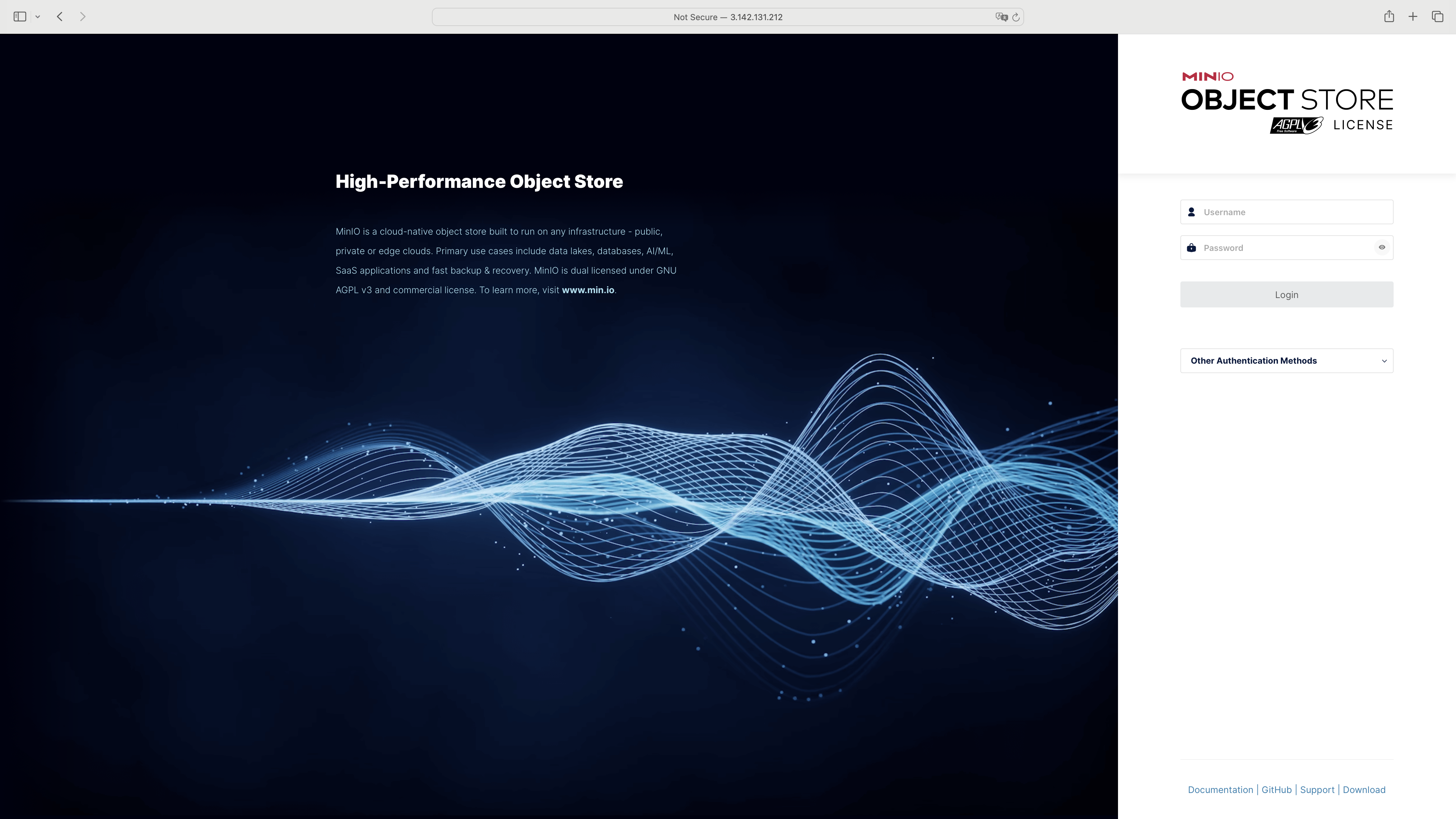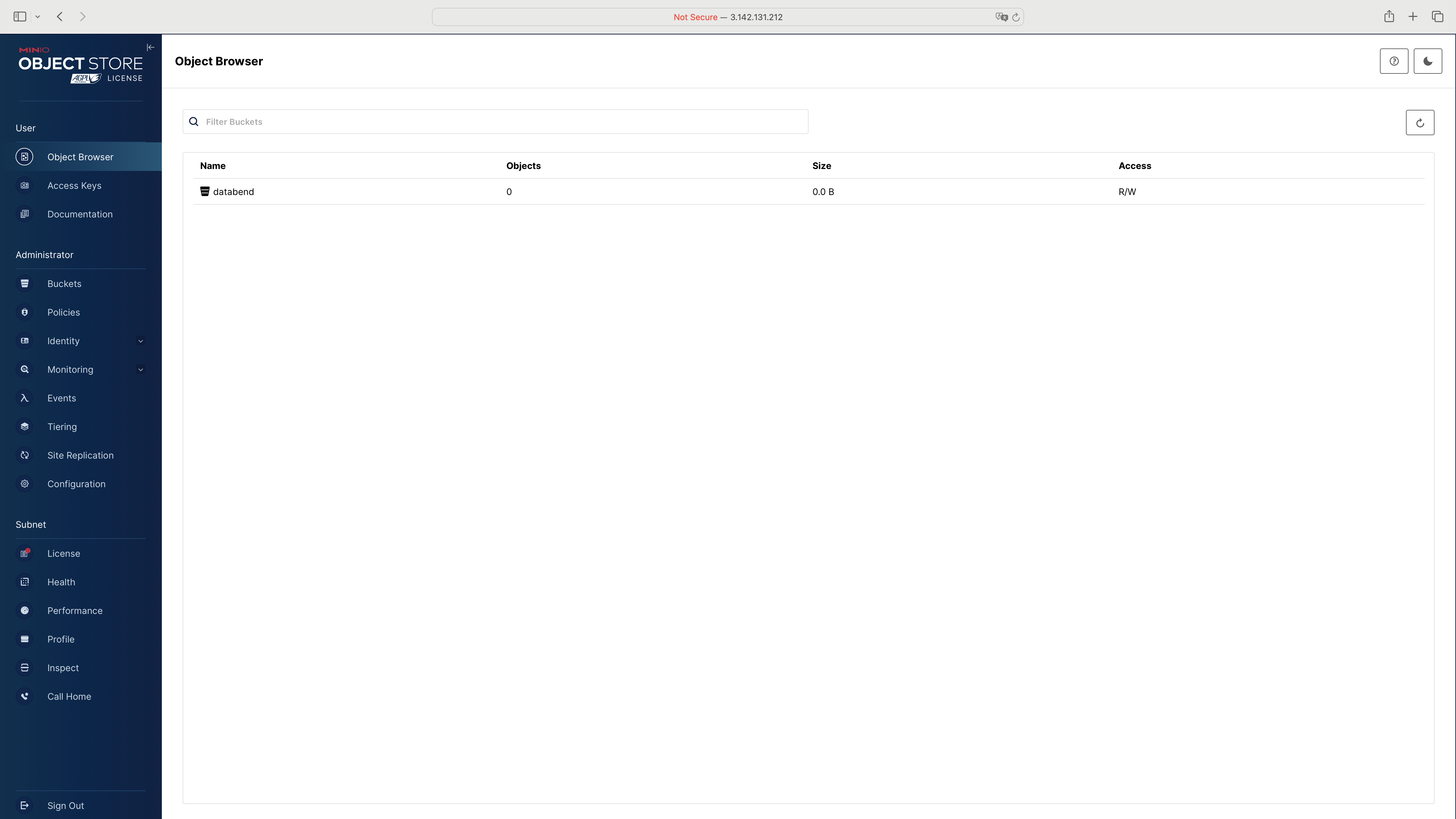Deploying on Docker
This guide walks you through deploying Databend with MinIO using Docker for a fully containerized setup on your local machine.
non-production use only
The MinIO deployment covered in this guide is only suitable for development and demonstration. Due to the limited resources in a single-machine environment, it is not recommended for production environments or performance testing.
Before You Start
Before you start, ensure you have the following prerequisites in place:
- Ensure that Docker is installed on your local machine.
- Ensure that BendSQL is installed on your machine. See Installing BendSQL for instructions on how to install BendSQL using various package managers.
Deploy MinIO
- Pull and run the MinIO image as a container with the following command:
note
- We change the console address to
9001here to avoid port conflicts. - The command also sets the root user credentials (
ROOTUSER/CHANGEME123) which you will need to provide for authentication in the next steps. If you make changes to the root user credentials at this point, ensure that you maintain consistency throughout the entire process.
docker run -d --name minio \
-e "MINIO_ACCESS_KEY=ROOTUSER" \
-e "MINIO_SECRET_KEY=CHANGEME123" \
-p 9000:9000 \
-p 9001:9001 \
minio/minio server /data \
--address :9000 \
--console-address :9001
- Run the command
docker logs minioto find the MinIO API and console (WebUI) addresses in the log message:
docker logs minio
INFO: WARNING: MINIO_ACCESS_KEY and MINIO_SECRET_KEY are deprecated.
Please use MINIO_ROOT_USER and MINIO_ROOT_PASSWORD
INFO: Formatting 1st pool, 1 set(s), 1 drives per set.
INFO: WARNING: Host local has more than 0 drives of set. A host failure will result in data becoming unavailable.
MinIO Object Storage Server
Copyright: 2015-2025 MinIO, Inc.
License: GNU AGPLv3 - https://www.gnu.org/licenses/agpl-3.0.html
Version: RELEASE.2025-04-03T14-56-28Z (go1.24.2 linux/arm64)
API: http://172.17.0.2:9000 http://127.0.0.1:9000
WebUI: http://172.17.0.2:9001 http://127.0.0.1:9001
Docs: https://docs.min.io
INFO:
You are running an older version of MinIO released 5 days before the latest release
Update: Run `mc admin update ALIAS`
- Open your web browser on your local machine and visit the MinIO console using the WebUI address shown (
http://127.0.0.1:9001) in the logs above.

- Log into the MinIO console with the credentials
ROOTUSER/CHANGEME123, and create a bucket nameddatabend.

Deploy Databend
- Pull and run the Databend image as a container with the following command:
note
- When starting the Databend Docker container, you can specify the username and password using the environment variables
QUERY_DEFAULT_USERandQUERY_DEFAULT_PASSWORD. If these variables are not provided, a default root user will be created without a password. - The command below also creates a SQL user (
databend/databend) which you will need to use to connect to Databend later. If you make changes to the SQL user at this point, ensure that you maintain consistency throughout the entire process.
docker run -d \
--name databend \
-p 3307:3307 \
-p 8000:8000 \
-p 8124:8124 \
-p 8900:8900 \
-e QUERY_DEFAULT_USER=databend \
-e QUERY_DEFAULT_PASSWORD=databend \
-e QUERY_STORAGE_TYPE=s3 \
-e AWS_S3_ENDPOINT=http://host.docker.internal:9000 \
-e AWS_S3_BUCKET=databend \
-e AWS_ACCESS_KEY_ID=ROOTUSER \
-e AWS_SECRET_ACCESS_KEY=CHANGEME123 \
datafuselabs/databend
- Run the command
docker logs databendto check the Databend log message and ensure the Databend container has started successfully:
docker logs databend
==> QUERY_CONFIG_FILE is not set, using default: /etc/databend/query.toml
==> /tmp/std-meta.log <==
Databend Metasrv
Version: v1.2.697-d40f88cc51-simd(1.85.0-nightly-2025-02-14T11:57:01.874747910Z)
Working DataVersion: V004(2024-11-11: WAL based raft-log)
Raft Feature set:
Server Provide: { append:v0, install_snapshot:v1, install_snapshot:v3, vote:v0 }
Client Require: { append:v0, install_snapshot:v3, vote:v0 }
Disk Data: V002(2023-07-22: Store snapshot in a file); Upgrading: None
Dir: /var/lib/databend/meta
Log File: enabled=true, level='Warn,databend_=Info,openraft=Info', dir=/var/log/databend, format=json, limit=48
Stderr: enabled=false(To enable: LOG_STDERR_ON=true or RUST_LOG=info), level=WARN, format=text
Raft Id: 0; Cluster: foo_cluster
Dir: /var/lib/databend/meta
Status: single
HTTP API listen at: 127.0.0.1:28002
gRPC API listen at: 127.0.0.1:9191 advertise: -
Raft API listen at: 127.0.0.1:28004 advertise: 055b9e5d09a9:28004
Upgrade ondisk data if out of date: V002
Find and clean previous unfinished upgrading
Upgrade on-disk data
From: V002(2023-07-22: Store snapshot in a file)
To: V003(2024-06-27: Store snapshot in rotbl)
No V002 snapshot, skip upgrade
Finished upgrading: V003
Upgrade on-disk data
From: V003(2024-06-27: Store snapshot in rotbl)
To: V004(2024-11-11: WAL based raft-log)
Upgrade V003 raft log in sled db to V004
Clean upgrading: V003 -> V004 (cleaning)
Remove V003 log from sled db
Removing sled tree: header
Removing sled tree: raft_log
Removing sled tree: raft_state
Done: Remove V003 log from sled db
Removing: /var/lib/databend/meta/heap
Removing: /var/lib/databend/meta/conf
Removing: /var/lib/databend/meta/db
Removing: /var/lib/databend/meta/DO_NOT_USE_THIS_DIRECTORY_FOR_ANYTHING
Finished upgrading: V004
Upgrade ondisk data finished: V004
Wait for 180s for active leader...
Leader Id: 0
Metrics: id=0, Leader, term=1, last_log=Some(3), last_applied=Some(T1-N0.3), membership={log_id:Some(T1-N0.3), {voters:[{0:EmptyNode}], learners:[]}}
Register this node: {id=0 raft=055b9e5d09a9:28004 grpc=}
Register-node: Ok
Databend Metasrv started
==> /tmp/std-query.log <==
Databend Query
Version: v1.2.697-d40f88cc51(rust-1.85.0-nightly-2025-02-14T11:30:59.842308760Z)
Logging:
file: enabled=true, level='INFO', dir=/var/log/databend, format=json, limit=48
stderr: enabled=false(To enable: LOG_STDERR_ON=true or RUST_LOG=info), level=WARN, format=text
Meta: connected to endpoints [
"0.0.0.0:9191",
]
Memory:
limit: unlimited
allocator: jemalloc
config: percpu_arena:percpu,oversize_threshold:0,background_thread:true,dirty_decay_ms:5000,muzzy_decay_ms:5000
Cluster: standalone
Storage: s3 | bucket=databend,root=,endpoint=http://host.docker.internal:9000
Disk cache:
storage: none
path: DiskCacheConfig { max_bytes: 21474836480, path: "./.databend/_cache", sync_data: true }
reload policy: reset
Builtin users: databend
Builtin UDFs:
Admin
listened at 0.0.0.0:8080
MySQL
listened at 0.0.0.0:3307
connect via: mysql -u${USER} -p${PASSWORD} -h0.0.0.0 -P3307
Clickhouse(http)
listened at 0.0.0.0:8124
usage: echo 'create table test(foo string)' | curl -u${USER} -p${PASSWORD}: '0.0.0.0:8124' --data-binary @-
echo '{"foo": "bar"}' | curl -u${USER} -p${PASSWORD}: '0.0.0.0:8124/?query=INSERT%20INTO%20test%20FORMAT%20JSONEachRow' --data-binary @-
Databend HTTP
listened at 0.0.0.0:8000
usage: curl -u${USER} -p${PASSWORD}: --request POST '0.0.0.0:8000/v1/query/' --header 'Content-Type: application/json' --data-raw '{"sql": "SELECT avg(number) FROM numbers(100000000)"}'
Connect to Databend
Launch a terminal on your local machine, then run the following command to connect to Databend:
bendsql -u databend -p databend
Welcome to BendSQL 0.24.1-f1f7de0(2024-12-04T12:31:18.526234000Z).
Connecting to localhost:8000 as user databend.
Connected to Databend Query v1.2.697-d40f88cc51(rust-1.85.0-nightly-2025-02-14T11:30:59.842308760Z)
Loaded 1411 auto complete keywords from server.
Started web server at 127.0.0.1:8080
You're all set! Now, you can execute a simple query to verify the deployment:
databend@localhost:8000/default> SELECT NOW();
SELECT NOW()
┌────────────────────────────┐
│ now() │
│ Timestamp │
├────────────────────────────┤
│ 2025-04-10 03:14:06.778815 │
└────────────────────────────┘
1 row read in 0.003 sec. Processed 1 row, 1 B (333.33 rows/s, 333 B/s)